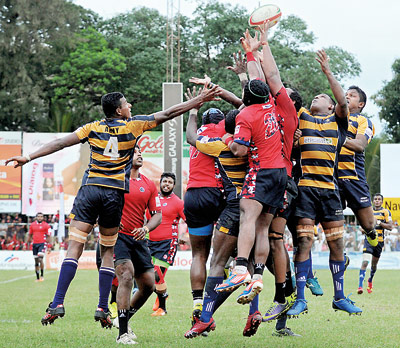Is Lankan Rugby moving in the right direction with or without foreigners?
View(s):From a fascinating rugby World Cup the news that dominated was the passing away of all time rugby great Jonah Lomu and the retirement of another notable rugby player Ritchie McCaw, both All Blacks. While the world was mourning and or rejoicing and before one could say dust to dust Sri Lanka opened the 2015/16 club rugby season.

The Dialog Division ‘A’ Club Tournament kicked off last week - Pic by Amila Gamage
This time the tournament is without foreigners and supporters wonder whether the game will pull back its head and shrink to its shell.
But then mama knows best when we say no foreigners but dad keeps saying Japan improved because of the foreigners.
This is like the debate on the budget where ordinary folks say we have nothing in it. Others hope for the manna from foreign investment will take us places.
The comments during the first week matches of don’t compare with World Cup games as some moaned about the way rugby was played in Sri Lanka.
It was like the many investigations that people talk about hoping for a utopian state. I was tickled when somebody asked a veteran when Sri Lankan can expect the locals to play the way they play at the World Cup.
Though what I saw in return was a cynical smile: I say we are getting there but don’t know when we will get there. Like the many investigations we talk about. This type of thinking is now finding a place in our way of life with and without sport.
In the games that I saw last week end a positive point was that the scrums were steady and the referees made a slower call.
This helped better ball emerging. Yet this can be improved further if there is more concentration of the binding and cutting off standing upfront.
There was also a tendency that was good as the tackler did release the tackled players and the tackled player release the ball.
An area that seemed to worry is the tendency of players to go to ground and block good ball by being on ground supporting body weight on the hands.
These areas will get better and we will see more flow of the game though we may be a way off World Cup rugby. The people will enjoy the game more if we continue to make room for the ball to be played.
While there is a lot of focus on the ball being let go fast at the breakdown the constant offside at the breakdown makes the game not flow despite good ball.
The quick penalising at the tackle seems to baffle spectators who think that there is a time to be given. Sometimes they think that a penalty is not fair as the ball career could not release the ball.
The key word in the law is “immediate” and the tackler must release the tackled player immediately and the tackled player must try to make the ball available immediately so that play can continue.
The law on blocking commonly called ‘sealing’ more specifically states all other players must be on their feet when they play the ball. Players are on their feet if no other part of their body is supported by the ground or players on the ground.
Navy got the better of Air Force by 36 points to 8 in the first match of the season in a battle that was on a muddy and boggy pit at Welisara.
Air Force showed that they have the talent to possibly challenge other clubs as the season progresses despite losing the first match.
The soggy outfield was the bane that possibly held back the progress of the Airmen. Navy on the other hand played without many of the stars who played with them last season.
Police played the second match against Havelock’s and lost by 19 points to 28 in a game of rugby that was disorganised. Police led six-nil in the first ten minutes but when they took lemons they were trailing the Park Club by 9 points to 13.
Star studded Police was a disappointment for most parts of the game but looked to have been suddenly woken up by the referees whistle as they approached the last 20 minutes but the effort was not enough.
To see a player crossing the line for the Police and knock the ball over was not hilarious but looked stupid. For all purposes this game between two equally matched teams did not reach an exciting standard nor was it entertaining.
The game between CR and Army reached a bit over the other two games in performance. The Army having secured a lead at halftime did not have on-field leadership to carry them through.
At half time it was CR 6 to Army 10 and in 20 minutes of the second half it was CR 16 and Army 15. The chip and chase by Ashan de Costa opened a score and changed the tide in the 25th minute which was won by CR by 35 points to 15.
In Kandy, CH took a surprising 3-nil lead in the first 3 minutes but failed to the greater onslaught where Kandy ended winners by 80 points to three.
Kandy must look back and ask whether in going forward they can afford to convert only 5 of 19 tries.
* Vimal Perera is a former player, coach, referee and an IRB Accredited Referees’ Educator


